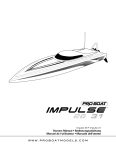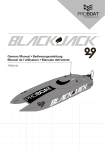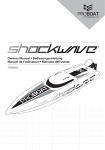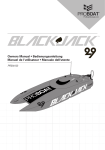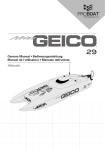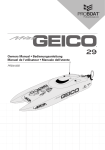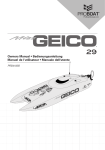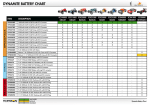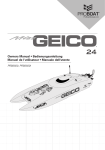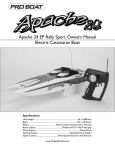Download ProBoat Impulse 31 PRB4250B Instruction manual
Transcript
Owners Manual • Bedienungsanleitung Manuel de l'utilisateur • Manuale dell'utente PRB4250B NOTICE All instructions, warranties and other collateral documents are subject to change at the sole discretion of Horizon Hobby, Inc. For up-to-date product literature, visit www.horizonhobby.com and click on the support tab for this product. WARNING: Read the ENTIRE instruction manual to become familiar with the features of the product before operating. Failure to operate the product correctly can result in damage to the product, personal property and cause serious injury. Meaning of Special Language This is a sophisticated hobby product and NOT a toy. It must be operated with caution and common sense and requires some basic mechanical ability. Failure to operate this Product in a safe and responsible manner could result in injury or damage to the product or other property. This product is not intended for use by children without direct adult supervision. Do not attempt disassembly, use with incompatible components or augment product in any way without the approval of Horizon Hobby, Inc. This manual contains instructions for safety, operation and maintenance. It is essential to read and follow all the instructions and warnings in the manual, prior to assembly, setup or use, in order to operate correctly and avoid damage or serious injury. The following terms are used throughout the product literature to indicate various levels of potential harm when operating this product: NOTICE: Procedures, which if not properly followed, create a possibility of physical property damage AND little or no possibility of injury. CAUTION: Procedures, which if not properly followed, create the probability of physical property damage AND a possibility of serious injury. WARNING: Procedures, which if not properly followed, create the probability of property damage, collateral damage, and serious injury OR create a high probability of superficial injury. Safety Precautions and Warnings As the user of this product, you are solely responsible for operating in a manner that does not endanger yourself and others or result in damage to the product or the property of others. • When handling and/or transporting your boat, always pick up the boat from the front, keeping all moving parts pointed away from you. • Always keep a safe distance in all directions around your model to avoid collisions or injury. This model is controlled by a radio signal subject to interference from many sources outside your control. Interference can cause momentary loss of control. • Always operate your model in open spaces away from full-size vehicles, traffic and people. Table of Contents Introduction..................................................................... 3 Recommended Tools and Materials.............................. 3 Product Inspection.......................................................... 3 Contents.......................................................................... 3 Specifications.................................................................. 3 Assembling the Boat Stand .......................................... 3 Install Propeller, Rudder and Fins................................. 4 Antenna Tube Installation............................................... 4 Installing the Battery Pack(s)......................................... 5 Transmitter Battery Installation .................................... 5 Transmitter Controls....................................................... 6 Getting Started Checking the Radio System........................................ 7 Binding ......................................................................... 8 Testing Your Boat in the Water.................................... 8 2 • Always carefully follow the directions and warnings for this and any optional support equipment (chargers, rechargeable battery packs, etc.). • Always keep all chemicals, small parts and anything electrical out of the reach of children. • Always avoid water exposure to all equipment not specifically designed and protected for this purpose. Moisture causes damage to unprotected electronics. • Never place any portion of the model in your mouth as it could cause serious injury or even death. • Never operate your model with low transmitter batteries. Age Recommendation: Not for children under 14 years. This is not a toy. Boating Tips Center of Gravity.......................................................... 9 Drive Height................................................................. 9 Motor Care.................................................................... 9 When You are Finished................................................ 9 Maintenance ................................................................ 10 ESC ................................................................................11 ESC Factory Settings.....................................................11 Checklists Before Boating........................................................... 12 After Boating.............................................................. 12 Troubleshooting Guide................................................ 12 Limited Warranty.......................................................... 14 FCC Information............................................................ 16 Compliance Information for the European Union..... 16 Replacement Parts.........................................................17 Impulse 31 Introduction Pro Boat® RC models look as good as they perform. Our boats, which include everything from scale sailboats to fully licensed powerboats, exceed expectations and provide years of radio control fun and excitement. Whether your passion leads you towards the pure serenity of sailing or the all-out speed of a Deep-V, Pro Boat models fit your taste, budget and lifestyle. You can count on us to be available any time you need help—the brand is backed by Horizon Hobby, the world’s largest distributor of hobby-grade RC products. The Pro Boat brand will help you turn your boating passion into a reality, whether you’re new to the hobby or an old pro. Please read this manual for operation and maintenance instructions. Register your boat online at www.proboatmodels.com. Recommended Tools and Materials Product Inspection • Needle nose pliers Carefully remove the boat and radio transmitter from the box. Inspect the boat for damage. If you find damage is present, please contact the hobby shop where you purchased your boat. • Paper towel • Rubbing alcohol • Open-end wrench: 10mm (2) • Nut driver: 7mm Contents • Phillips screwdriver: #1 • Hex wrench: 2.5mm, 3mm • Clear tape (PRB0102) • Pro Boat® Marine Grease and Gun (PRB0100) • (2) 7.4V 5200mAh Li-Po batteries (DYNP4000EC) or (2) Speedpack™ 4500mAh Ni-MH batteries (DYN1080EC) • Passport™ AC/DC Li-Po battery charger (DYN4066) or Prophet™ Sport AC/DC Peak Ni-MH battery charger (DYN4056) Specifications Length 31 in (787mm) Beam 9 in (229mm) Motor A3630-1800Kv Brushless Receiver Battery Requirements ESCProgrammable 80Amp Brushless with Reverse; Li-Po/Ni-MH switchable Water Cooling Steering System O ffset with Breakaway Rudder (2) 7.4V 30C+ Li-Po with EC3™ connectors or (2) 7.2V Ni-MH with EC3 connectors Drive System Hull Material iberglass F Composite Hull Type Deep-V Yes Transmitter S pektrum™ DX2E 2-Channel 2.4GHz Marine Spektrum MR200 irect drive D flexshaft 4 AA batteries (sold separately) are required to operate the transmitter. Assembling the Boat Stand 1. Attach the side stand pieces to the end pieces as shown. 2. Use medium CA or epoxy adhesive to secure the side stand pieces to the ends. 3. Allow the adhesive to dry before placing your boat on the stand. Impulse 31 3 Install Propeller, Rudder and Fins 1. Align the propeller with the drive dog on the flex shaft and install the propeller using the included locknut. Tip: Remove the left and right trim tabs from the boat to install the vertical fins more easily. 2. Install the left and right turn fins using two M3x8 cap screws for each turn fin (total of four screws). Adjust the vertical fins for the desired stability. 3. Install the left and right trim tabs using two M3x10 cap screws for each trim tab (total of four screws). 4. Attach the rudder to the rudder pivot plate using one M3x15 cap screw and one 3mm locknut (top hole). 5. Install one M3x10 Phillips head screw in the rudder pivot plate (bottom hole). The Phillips head screw also acts as a shear pin for the break-away rudder. 7. When the boat is moving forward, ensure water flows out of the coolant outlet on the side of the boat. If water does not flow out of this outlet, remove any blockage from the rudder inlet and coolant system or the motor and ESC (electronic speed control) may overheat. Ensure the trim tab panels are flush with the bottom of the boat. You may desire to bend the trim tabs for wind and water conditions. To adjust the angle of the trim tabs, use a large pair of pliers to bend the tabs. This must be done carefully so that you do not damage the hull. CAUTION: Always use caution when installing the fins or handling your boat, the turn fins are sharp. Failure to do so could cause personal injury 6. Connect the cooling line to the top of the rudder. 1 2 5 3 4 Antenna Tube Installation 1. Carefully feed the end of the longer receiver antenna through the grommet inside the hull. 2. Pull the antenna wire out of the grommet towards the outside of the boat, then slide the antenna through the antenna tube. 3. Insert the tube into the grommet, then fit the cap onto the tube. Arrange the shorter antenna in the hull at a right or near 90 degree angle to the antenna in the tube. Attach the antenna inside the hull, away from all electrical wiring and components using clear tape. The antennas must be installed correctly above the boat's water line to get the best reception of your transmitter's signal. 4. Apply clear tape to the antenna, grommet and hull in the boat to keep the antenna from moving. 4 Impulse 31 Battery Safety Precautions • When using a Li-Po battery, always ensure the Battery Chemistry Switch is in the ON position. • Always disconnect a battery from the ESC when not in use. • Never discharge a Li-Po battery below 3V per cell. • Avoid continually operating to LVC, as this could result in damage to the battery. Installing the Battery Pack(s) 2. Remove the radio box cover. Where needed, install the included self-adhesive hook strips on your battery pack(s). 5. Install the cover over the pack(s) and tighten the wing nut on the screw to hold the pack(s). Loosen the wing nut and move the pack(s) forward or back to adjust the center of gravity for your boat. Move the pack(s) toward the bow so the bow rides lower in the water. Move the pack(s) away from the bow so that the bow rides higher in the water. 3. Remove the wing nut and cover from the battery compartment. 6. Connect the battery pack(s) to the ESC power connectors. 4. Install the included hook and loop tape on the battery packs. Install the batteries on the hook and loop strips in the compartment, then place the included clear tube on the screw to prevent the screw from cutting the packs. 7. Disassemble in reverse order. 1. Turn the latch so that the tab is parallel with the back of the hull, then lift the hatch up and back from the hull. 1 3 2 5 4 Transmitter Battery Installation 1 2 3 Install 4 AA alkaline batteries into the transmitter, following the instructions provided for your radio system. Impulse 31 5 Transmitter Controls Reverse Switch BIND ST N TH R N R Allows you to change the direction of steering (ST. REV) and throttle (TH. REV) controls. (Default settings are “N” for steering and “R” for throttle) Steering Trim BIND ST N TH R N R Steering Rate Throttle Trim Adjust to make the vehicle drive straight with no input at the steering wheel Adjusts the neutral point of the electronic speed control Adjusts the amount the rudder moves when the steering wheel is turned left or right Steering Wheel Power Switch Power on or off the transmitter Control steering. Right and Left steering with ST. REV Switch on N (See ST. REV switch) ST. TRIM R POWE ST. RATE ST. TRIM R POWE ST. RATE TH. TRIM ST. TRIM R POWE ST. RATE Throttle Trigger TH. TRIM Controls power to the motor for forward or reverse (See TH. REV switch) TH. TRIM Battery Level Indicator Solid Green: Battery voltage is good (Above 4V). Flashing Green: Battery voltage is critically low (below 4V). Replace batteries. Reverse (when TH. REV switch on R) Stop Forward (when TH. REV switch on R) RF Mode The Pro Boat 2.4GHz transmitter has a France RF Mode that complies with French regulations. The transmitter must be in France mode when used outdoors in France. At all other times, the transmitter should be in Standard mode. 6 France mode Turn the wheel full left, pull the trigger to full throttle and hold down the bind button while turning on the transmitter. The Green LED will flash twice. Standard mode (Default preset set at factory) Turn the wheel full right, pull the trigger to full throttle and hold down the bind button while turning on the transmitter. The Green LED will flash once. Impulse 31 Getting Started 1. Power on the transmitter. 4. Power on the ESC switch. 2. Turn ON the Li-Po battery switch (when using Li-Po batteries). 5. Do a test of the transmitter’s control of the boat with the boat on the display stand. 6. After launching the boat in the water, start driving slowly, and, if the boat does not go straight, adjust the steering trim dial on the transmitter. 3. Connect the battery. ST. TRIM 1 2 R POWE TH. TRIM 4 5 3 ST. RATE ST. TRIM POWER ST. RATE TH. TRIM 6 ST. TRIM POWER ST. RATE TH. TRIM Checking the Radio System 4. Power on the ESC and the boat will beep 5 times. CAUTION: Always keep all body parts, hair and dangling or loose items away from the propeller and fin, as these could become entangled. NOTICE: Always power on the transmitter before powering on the ESC. Always power off the ESC before powering off the transmitter. Never transport the boat with the battery connected to the ESC. 1. Turn the transmitter throttle and steering trim knobs to the 10 o’clock position. 2. Power on the transmitter. 5. Ensure the rudder moves to the left when the steering wheel is turned left. 6. Pull the throttle to full, then return the throttle to neutral, ensuring the propeller turns counterclockwise. Brushless boats have an over-rev limit that will not allow you to hold full throttle when the propeller is not loaded (out of the water). If the over-rev limiter becomes engaged, rearm the ESC by returning the throttle trigger to neutral. The auto-sensing voltage cutoff will also engage when the ESC detects low battery charge. If this occurs, release the throttle and recharge the boat batteries. 3. Connect a fully charged battery to the ESC. left right forward reverse Failsafe In the unlikely event that the radio link is lost during use, the receiver will drive the servos to their preprogrammed failsafe positions (normally no throttle and straight steering). If the receiver is powered on before powering on the transmitter, the receiver will enter failsafe mode, driving the servos to their preset failsafe positions. When the transmitter is powered on, normal control is resumed. Failsafe servo positions are set during binding. Impulse 31 7 Binding Binding is the process of programming the receiver of the control unit to recognize the GUID (Globally Unique Identifier) code of a single specific transmitter. The DX2E and MR200 are bound at the factory. If you need to rebind, follow the instructions below. 4. Release the bind button when the green LED flashes. Bind Button BIND ST N TH R N R 1.With the receiver off, insert the bind plug into the BIND port on the receiver. 5. The receiver's LED will turn solid when the transmitter and receiver are bound. 2. When a battery is connected to the ESC and the ESC is connected to the throttle port on the receiver, power on the ESC switch. An LED on the receiver will flash rapidly, showing the receiver is in Bind mode. You must rebind when: 3. Do not touch the throttle or steering controls, as this sets failsafe settings. The throttle and throttle trim should always be at the lowest setting during bind mode. Press and hold the bind button and power on the transmitter. The green LED on the front of the transmitter will flash within three seconds, indicating the transmitter is in bind mode. Testing Your Boat in the Water 1. Carefully place the boat in the water. 2. Operate the boat at slow speeds near the shoreline. Avoid objects in the water at all times. 3. Once you are comfortable operating the boat at slow speeds, it is safe to operate the boat farther from the shore. 4. When the boat is moving forward, ensure water flows out of the coolant outlet. Remove any blockage from the rudder inlet and coolant system or the motor and ESC (electronic speed control) may overheat. 6. Remove the bind plug and store it in a convenient place. • Changing receiver types e.g., changing from a DSM® receiver to a DSM2® or Marine receiver. • Binding the receiver to a different transmitter. Important: If you are using too much steering trim on your transmitter to make the boat steer straight, mechanically center the rudder. Return the steering control to neutral, loosen the ball link on the rudder horn, then turn the linkage threads until the ruder is centered 5. Bring the boat back to shore when you notice the boat starting to lose speed. 6. Power off the ESC and disconnect the battery packs. 7. Allow the motor, ESC and battery packs to cool before charging the batteries or operating the boat again. NOTICE: Do not turn off the transmitter first or the receiver may pick up stray signals and run out of control. Boating Tips CAUTION: Always ensure you are operating this boat a safe distance (15 feet, 5 meters) away from people and/or other vehicles in the water. Avoid boating near other watercraft, stationary objects, waves, wakes and other rapidly moving water, wildlife, floating debris or overhanging trees. You should also be careful to avoid boating in areas where there are many people, such as swimming areas, park waterways or fishing areas. Consult local laws and ordinances before choosing a location to pilot your boat. Maximum speeds are only achieved when the water conditions are smooth and there is little wind. A sharp turn, wind or waves can turn over a boat when it is moving quickly. Always pilot your boat for the wind and water conditions so that the boat does not turn over. 8 When running your boat for the first time, we recommend calm wind and water conditions so that you can learn how the boat responds to your control. When making turns, decrease the throttle position in order to decrease speed and probability of flipping the boat over. NOTICE: When running at full speed in choppy waters, the prop may exit and re-enter the water repeatedly and very quickly, subjecting the propeller to some stress. Frequent stress may damage the propeller. CAUTION: Never retrieve your boat from the water in extreme temperatures, turbulence or without supervision. Impulse 31 Center of Gravity Moving the batteries to the front or back can significantly affect the boat's performance. 1. Move the batteries toward the rear of the boat to raise the front of the hull out of the water for increased speed. 2. Move the batteries toward the front of the boat for faster initial acceleration to eliminate oscillation or bouncing and to increase stability. Drive Height Lowering the drive will increase the propeller's ability to bite at takeoff, but excessive lowering can cause the back of the boat to feel loose and decrease top end stability. Raising the drive helps eliminate oscillation or bouncing and with top end stability, but excessively raising the drive can reduce top speeds and cause cavitation. You may also turn the dual rate dial down to reduce rudder travel in rough water conditions. If the conditions are questionable, adjust the prop strut down a bit to reduce the likelihood of having the boat overturn. The motor mount is slotted to allow you to move the motor slightly when adjusting the propeller strut. Loosen the motor mounting screws when adjusting the propeller strut angle trim and retighten after adjustment is complete. Use a 3mm hex wrench and 7mm nut driver to loosen the bolt that attaches the output to the bracket to adjust the height. Raise or lower the prop strut. Tighten the bolt when adjustment is complete. Motor Care • Prolong motor life by preventing overheating conditions. Undue motor wear results from frequent turns, stops and starts, pushing objects, boating in rough water or vegetation and boating continuously at high speed. • Over-temperature protection is installed on the ESC to prevent circuit damage, but cannot protect the motor from pushing against heavy resistance. When You are Finished 1. Power off the ESC. 2. Disconnect the battery. 1 2 3. Power off the transmitter. 4. Remove the battery from the boat. Always store the boat open (without the hatch and innner liner sealed) or moisture may allow mold and mildew to grow in the boat. 3 ST. TRIM R POWE 4 ST. RATE TH. TRIM Impulse 31 9 Maintenance CAUTION: Always replace the flexshaft when it is damaged or shows visible wear. Failure to do so could result in personal injury or property damage. Lubricating the flexshaft is vital to the life of the drivetrain. The lubricant also acts as a water seal, keeping water from entering the hull through the stuffing box. 3. Remove the drive shaft by sliding it out of the stuffing box. Wipe lubricant and material from the flexshaft. Lubricate the full length of the flexshaft assembly up to the drive dog using marine grease (PRB0101 or PRB0100). 4. Apply threadlock to the coupling setscrew. Threadlock will help prevent the flexshaft from loosening during use. Lubricate the flexshaft, propeller shaft and all moving parts after every 2–3 hours of operation. Always replace any parts that show visible wear or damage. 1. Loosen the coupling between the motor and the flexshaft. 5. Carefully reinstall the drive shaft, ensuring that there is a 1–2mm gap between the prop strut and the drive dog to allow for flexshaft shrinkage under load. 2. Loosen the setscrew from the flexshaft and remove the flexshaft from the back of the boat. NOTICE: Running the boat in saltwater could cause some parts to corrode. If you run the boat in saltwater, rinse it thoroughly in fresh water after each use and lubricate the drive system. NOTICE: Because of its corrosive effects, running RC boats in saltwater is at the discretion of the modeler. Tip: Use paper or cloth to touch the flexshaft. 10 Impulse 31 ESC The included ESC programming card (DYNM3821) allows you to quickly program your Dynamite® Marine Brushless ESC control settings. Programmable Settings Throttle Reverse: ON or OFF Cutoff Voltage: High Cutoff or Low Cutoff High Cutoff: The Ni-MH Cutoff voltage is .9 volts per cell and the Li-Po Cutoff is 3.3 volts per cell. High Cutoff allows ample power in reserve after Cutoff for returning the boat to shore. Low Cutoff: The Ni-MH Cutoff voltage is .7 volts per cell and the Li-Po Cutoff is 3.0 volts per cell. Low Cutoff allows longer runtimes, but leaves less power in reserve after Cutoff for returning the boat to shore. Cutoff Type: Idle or Slow Down Idle: When the Cutoff voltage is reached, the ESC will stop delivering power to the motor. Slow Down: When the Cutoff voltage is reached, the ESC will drop to 50% power at full throttle. To reset, return the throttle to neutral. Brake: ON or OFF ON: The boat will stop immediately when the throttle is returned to neutral. OFF: The boat will coast to a stop. Timing: Low Timing or High Timing Low Timing: For 2-, 4- or 6-pole inrunner motors. Allows the longest run times. High Timing: For 6-pole or more inrunner and outrunner motors. High timing increases both motor RPM and current draw (up to 20% increase compared to low timing) using the same battery pack and prop. Run times will be signicantly reduced. Only use High Timing if the temperatures of the electronic components do not exceed 130°F (54°C) in Low Timing mode. Throttle Curve: Linear or Logarithm Linear: The ESC delivers 60% power at half throttle and 100% power at full throttle. Logarithm: The ESC delivers 45% power at half throttle and 80% power at full throttle (recommended for beginners). Using the ESC Programming Card 1. Set all programming card setting switches to the desired positions. 2. Ensure the ESC is powered OFF and disconnected from a battery. 3. Connect the ESC receiver lead to the ESC port on the programming card, noting proper polarity. 4. Connect a fully charged battery to the ESC or the programming card, then power on the ESC. 5. The ESC will beep, indicating that the new programming has been accepted. ESC Factory Settings ReverseOn Cutoff voltageHigh Cutoff typeIdle BrakeOn 6. After programming is completed, power OFF the ESC, disconnect the ESC receiver lead from the programming card and reconnect it to the throttle port on the receiver, noting proper polarity. 7. To reprogram, power OFF the ESC and disconnect the battery for 5 seconds, then repeat the steps above. TimingLow Throttle CurveLogarithmic Impulse 31 11 Checklists Before Boating After Boating • Install fully charged batteries in your boat and transmitter • Always power off the receiver before powering off the transmitter to maintain control of the boat and to retain transmitter binding • Connect the boat’s battery to the ESC • Make sure the boat is bound to the transmitter (otherwise, bind the boat to the transmitter using the included binding instructions) • Make sure all linkages move freely on the boat • Ensure the motor mount is secured to the hull so that the motor does not move • Perform a Control Direction Test with the transmitter • Adjust the steering rate on your transmitter as desired • Find a safe and open boating area • Plan a safe boating route for the water and wind conditions • Disconnect the battery from the receiver and remove the batteries from the boat • Fully dry the inside and outside of the boat, including the water cooling lines and jackets around the motor and ESC. Remove the hatch and radio box cover before storing your boat • Repair any damage or wear to the boat • Lubricate the flex shaft • Make note of lessons learned from the trimming of your boat, including water and wind conditions Tip: The hook and loop strips in the boat retain water. To dry them, press on them with a dry cloth. Troubleshooting Guide Problem Possible Cause Solution Boat will not respond to throttle but responds to other controls Throttle servo travel is lower than 100% Make sure throttle servo travel is 100% or greater Throttle channel is reversed Reverse throttle channel on transmitter Extra noise or extra vibration Damaged propeller, shaft or motor Replace damaged parts Propeller is out of balance Balance or replace propeller Reduced run time or boat underpowered Boat battery charge is low Completely recharge battery Boat battery is damaged Replace boat battery and follow battery instructions Blocking or friction on shaft or propeller Disassemble, lubricate and correctly align parts Boat conditions may be too cold Make sure battery is warm before use Battery capacity may be too low for conditions Replace battery or use a larger capacity battery Drive dog is too close Loosen coupling at flex shaft and move out flex shaft a small amount Too little lubrication on flex shaft Fully lubricate flex shaft Vegetation or other obstacles block the rudder or propeller Remove boat from the water and obstacles Transmitter is too near boat during binding process Move powered transmitter a few feet from boat, disconnect and reconnect battery to boat Boat or transmitter is too near large metal object, wireless source or another transmitter Move boat and transmitter to another location and attempt binding again Bind plug is not installed correctly Install bind plug and bind boat to transmitter Boat battery/Transmitter battery charge is too low Replace/recharge batteries ESC switch is off Power on ESC switch Boat will not bind (during binding) to transmitter 12 Impulse 31 Troubleshooting Guide Boat will not connect (after binding) to transmitter Transmitter is too near boat during connecting process Move powered transmitter a few feet from boat, disconnect and reconnect battery to boat Boat or transmitter is too near large metal object, wireless source or another transmitter Move boat and transmitter to another location and attempt linking again Bind plug is left installed Rebind transmitter to boat and remove bind plug before cycling power Boat battery/transmitter battery charge is too low Replace/recharge batteries Transmitter may have been bound to a different model (using different DSM Protocol) Bind boat to transmitter ESC switch is off Power on ESC switch The boat hull is not completely closed Dry out the boat and ensure the hatch is fully closed on the hull before returning the boat to the water Center of gravity is too far forward Move batteries back in the hull Trim tabs are angled incorrectly on the back of the boat Angle each trim tab up a small amount to lift the bow or down a small amount to lower the bow Rudder or rudder trim is not centered Repair rudder or adjust rudder and rudder trim for straight running when control is at neutral Vertical fins are angled incorrectly Angle the fins a small amount right or left so that the boat goes straight when the rudder is at neutral Rudder, linkage or servo damage Replace or repair damaged parts and adjust controls Wire is damaged or connections are loose Do a check of wires and connections, connect or replace as needed Transmitter is not bound correctly or the incorrect model was selected Re-bind or select correct model in transmitter BEC (Battery Elimination Circuit) of the ESC is damaged Replace ESC ESC switch is off Power on ESC switch Controls reversed Transmitter settings are reversed Do the Control Direction Test and adjust controls on transmitter appropriately Motor or ESC overheats Blocked water cooler tubes Clean or replace water tubes Motor power pulses then motor loses power ESC uses default soft Low Voltage Cutoff (LVC) Recharge boat battery or replace battery that is no longer performing Weather conditions might be too cold Postpone until weather is warmer Battery is old, worn out or damaged Replace battery Battery C rating might be too small Use recommended battery Boat tends to dive in the water or takes on water Boat tends to turn one direction Rudder does not move Impulse 31 13 Limited Warranty What this Warranty Covers Horizon Hobby, Inc. (“Horizon”) warrants to the original purchaser that the product purchased (the "Product") will be free from defects in materials and workmanship at the date of purchase. What is Not Covered This warranty is not transferable and does not cover (i) cosmetic damage, (ii) damage due to acts of God, accident, misuse, abuse, negligence, commercial use, or due to improper use, installation, operation or maintenance, (iii) modification of or to any part of the Product, (iv) attempted service by anyone other than a Horizon Hobby authorized service center, (v) Product not purchased from an authorized Horizon dealer, or (vi) Product not compliant with applicable technical regulations. OTHER THAN THE EXPRESS WARRANTY ABOVE, HORIZON MAKES NO OTHER WARRANTY OR REPRESENTATION, AND HEREBY DISCLAIMS ANY AND ALL IMPLIED WARRANTIES, INCLUDING, WITHOUT LIMITATION, THE IMPLIED WARRANTIES OF NONINFRINGEMENT, MERCHANTABILITY AND FITNESS FOR A PARTICULAR PURPOSE. THE PURCHASER ACKNOWLEDGES THAT THEY ALONE HAVE DETERMINED THAT THE PRODUCT WILL SUITABLY MEET THE REQUIREMENTS OF THE PURCHASER’S INTENDED USE. Purchaser's Remedy Horizon’s sole obligation and purchaser’s sole and exclusive remedy shall be that Horizon will, at its option, either (i) service, or (ii) replace, any Product determined by Horizon to be defective. Horizon reserves the right to inspect any and all Product(s) involved in a warranty claim. Service or replacement decisions are at the sole discretion of Horizon. Proof of purchase is required for all warranty claims. SERVICE OR REPLACEMENT AS PROVIDED UNDER THIS WARRANTY IS THE PURCHASER’S SOLE AND EXCLUSIVE REMEDY. Limitation of Liability HORIZON SHALL NOT BE LIABLE FOR SPECIAL, INDIRECT, INCIDENTAL OR CONSEQUENTIAL DAMAGES, LOSS OF PROFITS OR PRODUCTION OR COMMERCIAL LOSS IN ANY WAY, REGARDLESS OF WHETHER SUCH CLAIM IS BASED IN CONTRACT, WARRANTY, TORT, NEGLIGENCE, STRICT LIABILITY OR ANY OTHER THEORY OF LIABILITY, EVEN IF HORIZON HAS BEEN ADVISED OF THE POSSIBILITY OF SUCH DAMAGES. Further, in no event shall the liability of Horizon exceed the individual price of the Product on which liability is asserted. As Horizon has no control over use, setup, final assembly, modification or misuse, no liability shall be assumed nor accepted for any resulting damage or injury. By the act of use, setup or assembly, the user accepts all resulting liability. If you as the purchaser or user are not prepared to accept the 14 liability associated with the use of the Product, purchaser is advised to return the Product immediately in new and unused condition to the place of purchase. Law These terms are governed by Illinois law (without regard to conflict of law principals). This warranty gives you specific legal rights, and you may also have other rights which vary from state to state. Horizon reserves the right to change or modify this warranty at any time without notice. WARRANTY SERVICES Questions, Assistance, and Services Your local hobby store and/or place of purchase cannot provide warranty support or service. Once assembly, setup or use of the Product has been started, you must contact your local distributor or Horizon directly. This will enable Horizon to better answer your questions and service you in the event that you may need any assistance. For questions or assistance, please visit our website at www.horizonhobby.com, submit a Product Support Inquiry, or call 877.504.0233 toll free to speak to a Product Support representative. Inspection or Services If this Product needs to be inspected or serviced and is compliant in the country you live and use the Product in, please use the Horizon Online Service Request submission process found on our website or call Horizon to obtain a Return Merchandise Authorization (RMA) number. Pack the Product securely using a shipping carton. Please note that original boxes may be included, but are not designed to withstand the rigors of shipping without additional protection. Ship via a carrier that provides tracking and insurance for lost or damaged parcels, as Horizon is not responsible for merchandise until it arrives and is accepted at our facility. An Online Service Request is available at http://www.horizonhobby. com/content/_service-center_render-service-center. If you do not have internet access, please contact Horizon Product Support to obtain a RMA number along with instructions for submitting your product for service. When calling Horizon, you will be asked to provide your complete name, street address, email address and phone number where you can be reached during business hours. When sending product into Horizon, please include your RMA number, a list of the included items, and a brief summary of the problem. A copy of your original sales receipt must be included for warranty consideration. Be sure your name, address, and RMA number are clearly written on the outside of the shipping carton. Notice: Do not ship LiPo batteries to Horizon. If you have any issue with a LiPo battery, please contact the appropriate Horizon Product Support office. Impulse 31 Warranty Requirements a minimum of ½ hour of labor. In addition you will be billed for return freight. Horizon accepts money orders and cashier’s checks, as well as Visa, MasterCard, American Express, and Discover cards. By submitting any item to Horizon for service, you are agreeing to Horizon’s Terms and Conditions found on our website http://www.horizonhobby.com/content/_service-center_ render-service-center. For Warranty consideration, you must include your original sales receipt verifying the proof-ofpurchase date. Provided warranty conditions have been met, your Product will be serviced or replaced free of charge. Service or replacement decisions are at the sole discretion of Horizon. Non-Warranty Service Should your service not be covered by warranty, service will be completed and payment will be required without notification or estimate of the expense unless the expense exceeds 50% of the retail purchase cost. By submitting the item for service you are agreeing to payment of the service without notification. Service estimates are available upon request. You must include this request with your item submitted for service. Non-warranty service estimates will be billed NOTICE: Horizon service is limited to Product compliant in the country of use and ownership. If non-compliant product is received by Horizon for service, it will be returned unserviced at the sole expense of the purchaser. Warranty and Service Contact Information Country of Purchase United States of America Horizon Hobby Contact Information Horizon Service Center (Repairs and Repair Requests) servicecenter.horizonhobby. com/RequestForm/ Horizon Product Support (Product Technical Assistance) Sales United Kingdom Germany Service/Parts/Sales: Horizon Hobby Limited www.quickbase.com /db/bghj7ey8c?a= GenNewRecord 4105 Fieldstone Rd Champaign, Illinois, 61822 USA 888-959-2306 [email protected] 888-959-2306 [email protected] +44 (0) 1279 641 097 Horizon Technischer Service [email protected] Sales: Horizon Hobby GmbH +49 (0) 4121 2655 100 France Service/Parts/Sales: Horizon Hobby SAS [email protected] China Service/Parts/Sales: Horizon Hobby – China [email protected] Impulse 31 Address +33 (0) 1 60 18 34 90 +86 (021) 5180 9868 Units 1–4 , Ployters Rd, Staple Tye Harlow, Essex, CM18 7NS, United Kingdom Christian-Junge-Straße 1 25337 Elmshorn, Germany 11 Rue Georges Charpak 77127 Lieusaint, France Room 506, No. 97 Changshou Rd. Shanghai, China 200060 15 FCC Information Antenna Separation Distance This device complies with part 15 of the FCC rules. Operation is subject to the following two conditions: When operating your Spektrum transmitter, please be sure to maintain a separation distance of at least 5 cm between your body (excluding fingers, hands, wrists, ankles and feet) and the antenna to meet RF exposure safety requirements as determined by FCC regulations. (1) This device may not cause harmful interference, and (2) This device must accept any interference received, including interference that may cause undesired operation. CAUTION: Changes or modifications not expressly approved by the party responsible for compliance could void the user’s authority to operate the equipment. The following illustrations show the approximate 5 cm RF exposure area and typical hand placement when operating your Spektrum transmitter. This product contains a radio transmitter with wireless technology which has been tested and found to be compliantwith the applicable regulations governing a radio transmitter in the 2.400GHz to 2.4835GHz frequency range. Compliance Information for the European Union AT ES LT RO BE FI LU SE BG FR LV SI CZ CY DE GR HU IE MT NL PL SK UK DK IT PT Declaration of Conformity (in accordance with ISO/IEC 17050-1) No. HH2012071902 Product(s):PRB Impulse 31 BL (Spektrum DX2E and MR200 Receiver Included) Item Number(s): PRB4250B Equipment class: 1 The object of declaration described above is in conformity with the requirements of the specifications listed below, following the provisions of the European R&TTE directive 1999/5/EC, EMC Directive 2004/108/EC and LVD 2006/95/EC: Instructions for Disposal of WEEE by Users in the European Union This product must not be disposed of with other waste. Instead, it is the user’s responsibility to dispose of their waste equipment by handing it over to a designated collection point for the recycling of waste electrical and electronic equipment. The separate collection and recycling of your waste equipment at the time of disposal will help to conserve natural resources and ensure that it is recycled in a manner that protects human health and the environment. For more information about where you can drop off your waste equipment for recycling, please contact your local city office, your household waste disposal service or where you purchased the product. EN 300-328 V1.7.1 : 2006 EN 301 489-1 V1.7.1: 2006 EN 301 489-17 V1.3.2: 2008 EN 60950-1:2006+A12: 2011 EN55022: 2010 EN55024: 2010 Signed for and on behalf of: Horizon Hobby, Inc. Champaign, IL USA July 19, 2012 16 Steven A. Hall Executive Vice President and Chief Operating Officer International Operations and Risk Management Horizon Hobby, Inc. Impulse 31 Identification of Components B L A E S M O G P K Impulse 31 D N F 17 U J T I Q Z C H W Y X AA Replacement Parts A PRB4270 Hull Only: IM31B O PRB4265 Rudder Pushrod: IM31 B PRB4271 Canopy: IM31B P PRB4266 Prop Strut: IM31 C PRB4019 1.6" x 2.5" Stainless Steel Propeller Q PRB4267 Flexshaft Liner: IM31 R PRB4268 Battery Cover: IM31 D PRB4254 Rudder Pivot Plate: IM31 S PRB4269 Rudder Pivot Shaft: IM31 E PRB4255 Rudder Control Arm: IM31 T DYNM3820 F PRB4256 Prop Strut Mount: IM31 80A Dual Battery, Marine, Brushless ESC U DYNM3830 1800Kv, 6-pole, Water Cooled, Marine Motor V DYNM3821 BL ESC Programming Module W DYN3900 Surface Servo, 3kg, Water Proof, 25-Spline X SPMMR200 Marine Receiver Y PRB4109 MG29 prop nut, 8 mm Z PRB2763 Cooling tube AA PRB4012 Antenna tube G PRB4257 Rudder Screws: IM31 H PRB4258 Flexshaft: IM31 I PRB4259 Motor Coupler: IM31 J PRB4260 Motor Mount: IM31 K PRB4261 Drain Plug: IM31, IM26 L PRB4262 Canopy Seal: IM31 M PRB4263 Rudder Strut: IM31 N PRB4264 Rudder: IM31 Optional Parts PRB0100 Marine grease PRB0102 Waterproof tape DYN4066 Li-Po charger DYN4056 Prophet Sport AC/DC Peak Charger 18 DYN1081EC Dynamite Speedpack 4500mAh Ni-MH 6-Cell Flat DYNP4000EC 5200mAh 50C 2-Cell 7.4 volt Li-Po Battery SPM2300 DX2E 2-Channel DSM Surface Radio Impulse 31 Impulse 31 19 35928.1 Printed: 3/2013 ©2012 Horizon Hobby, Inc. Pro Boat, Impulse, Dynamite, Speedpack, EC3, Prophet, DSM, DSM2, the Pro Boat logo and the Horizon Hobby logo are trademarks or registered trademarks of Horizon Hobby, Inc. The Spektrum trademark is used with permission of Bachmann Industries, Inc.




















